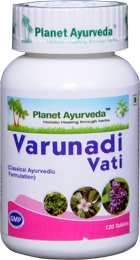A kidney stone is a hard and crystalline material formed within the kidney. The medical term for kidney stones is ‘nephrolithiasis’. Kidney stones are a common cause of blood in the urine and the condition is known as ‘hematuria’. Kidney stones are also called ‘renal calculi’. The formation of kidney stones takes place when there is a decrease in urine volume and an excess of stone-forming substances in the urine. Dehydration has been reported as a major risk factor for kidney stone formation. Certain medical conditions such as gout may also lead to the formation of kidney stones. Dietary and hereditary factors are also related to kidney stone formation. The kidney stones may get stuck in the urinary tract, block the flow of urine and cause severe pain. Kidney stones have become a common problem throughout the world. Every person including adults and children are at risk of developing kidney stones. Analysis reports indicate the urine has dissolved substances which can precipitate and develop into stones. In some people, even if stones are formed they are usually small in size and pass in the urine without any symptoms.
Most patients with kidney stones are free of symptoms, until a stone gets lodged in any part of the kidney and causes acute pain. However, the most common symptom of kidney stone is fluctuating pain. In most patients, flow of urine is blocked and there is back pain or pain along the sides and just below the ribs. Other symptoms may include fixed, intermittent dull pain in the region of the kidneys which is more aggravated by movement. Severe pain occurs if the stone gets lodged in the ureter. Some patients show symptoms such as profuse sweating, nausea, vomiting, chills and fevers, blood tinged urine, foul smelling urine and constant urge to urinate.
As per scientific research, kidney stones and renal colic probably cannot be prevented, but the risk of forming a stone can be minimized by avoiding dehydration. It is obvious that keeping the urine dilute will not allow the chemical crystals to come out of solution and form the beginning of a stone. Medication may be prescribed for certain types of kidney stones. In severe cases, surgery is recommended for the removal of kidney stones. In some cases, kidney stones can cause so intense pain that a person has to be admitted to the hospital or in emergency.
Ayurveda has gained popularity for the treatment of kidney stones. More people prefer natural treatment to avoid the side-effects associated with prescription drugs and medicines. Herbal medicines usually do not have side-effects. Herbalists recommend ayurvedic treatment to the patients who suffer from kidney stones. Natural remedies and medicinal herbs help to remove kidney stones and to treat the related symptoms. There are many natural herbs that can help with the removal of kidney stones. The herbal remedies can help to address the size of the stones departing from the urine. The kidney stones can vary in size, from as small as a minute grain of sand to as large as ball.
Our herbal remedies comprise of natural herbs and help to give relief from the common symptoms of kidney stones which include mild to moderate abdominal pain, pain in the genital area, extreme pain in the area of the buttocks and a burning sensation during urination.
Herbal Remedy for Kidney Stones by Planet Ayurveda
Varunadi Vati is a special Ayurvedic remedy which helps to get rid of renal stones and urinary tract infections. It relives the pain caused by renal stones and removes them without surgeries. This herbal formulation is natural and does not cause any side-effects. This product is conveniently formulated in a tablet form. Modern medicines might do certain damage to the person as they crush and break the stone inside the kidney, which could lead to severe complications. However, this medicine helps to dissolve the stone completely and lets it naturally pass through the urine. It does not cause any pain or discomfort at all.

